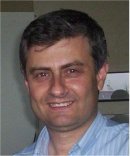|
||||||||||||||
|
Plenary
Lecture
Abstract: It is widely accepted that the most
significant motif for the fast growing field of tandem
mass spectrometry was to respond to the requirements of
biochemistry, molecular biology, medical and medicinal
chemistry. Reversely, the fast development of genomic
research during the previous decade, the continuous
expansion of proteomics and of metabolomics, as well as
the recent interest in metallomics are mainly due to the
capabilities offered by modern mass spectrometric
instrumentation. The presentation will be focused mainly
to the performance of some modern tandem mass
spectrometric concepts, as introduced from several
manufacturers, although the list is quite large and not
all of them can be presented. There are many instruments
commercially available for this purpose, capable for
direct or hyphenated mass spectrometric analysis in one
step (MS). However the demand for structure elucidation
of extremely complicated unknown compounds, like
proteins and peptides, nucleic acids, carbohydrates and
their complexes, and many other types of biomolecules,
forced the research to move to the second step, i.e. the
development of much more sophisticated spectrometers
combining two or three analyzers successively, the so
called tandem mass spectrometers. These are capable to
provide multi-stage mass spectrometric analysis (MSn),
which means selection of precursor ions and further
fragmentation of them to produce daughter ions, enabling
thus the characterization of the above matrices. In a
third step, since there are still many cases with
confusion among several possible chemical structures,
especially in the field of biochemistry, high-resolution
tandem mass instruments (HRMS) were further developed
and the current commercial competition shifts the
research to even higher standards.
|
|
|||||||||||||
|
|
|
|
||||||||||||
| copyright - designed by WSEAS | ||||||||||||||
